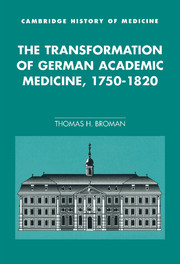Book contents
- Frontmatter
- Contents
- Acknowledgments
- Introduction
- 1 Physicians in eighteenth-century Germany
- 2 Fractures and new alignments
- 3 Physicians and writers: Medical theory and the emergence of the public sphere
- 4 The art of healing
- 5 Breaking the shackles of history: The Brunonian revolution in Germany
- 6 German academic medicine during the reform era
- Conclusion: Disciplines, professions, and the public sphere
- Index
- Cambridge History of Medicine
Introduction
Published online by Cambridge University Press: 30 September 2009
- Frontmatter
- Contents
- Acknowledgments
- Introduction
- 1 Physicians in eighteenth-century Germany
- 2 Fractures and new alignments
- 3 Physicians and writers: Medical theory and the emergence of the public sphere
- 4 The art of healing
- 5 Breaking the shackles of history: The Brunonian revolution in Germany
- 6 German academic medicine during the reform era
- Conclusion: Disciplines, professions, and the public sphere
- Index
- Cambridge History of Medicine
Summary
In recent years, the professions have been a subject of growing fascination for historians and sociologists. The reasons are not difficult to find. Talcott Parsons may have overstated the centrality of the professions when he claimed in 1968 that they were “the most important single component” in modern society, but there is no denying the prominent position occupied by professional “experts” of various stripes. One has only to take in the nightly news broadcast on public television, where it seems that nearly every matter of current interest is rendered as a debate between experts, to appreciate the role they play in our world. Or consider that in 1993, when Hillary Rodham Clinton began putting together a proposal for reforming America's health care system, her first act was to gather together a group of professional experts on various aspects of health care to discuss the framework of such a plan. It is not that fundamental political and ideological issues – such as the desirability of guaranteeing medical care to every citizen – were thereby rendered meaningless or unimportant in the face of such consultations. But the political questions were shaped in significant ways by what those experts had to say about the way the world is.
The reference to medicine is an appropriate one, because in one sense this book is about the origins of the modern medical profession. Put that way, of course, the project sounds a little grandiose.
- Type
- Chapter
- Information
- Publisher: Cambridge University PressPrint publication year: 1996

